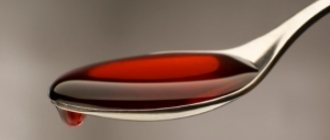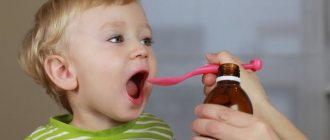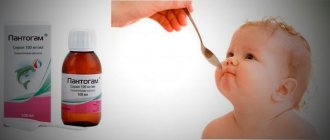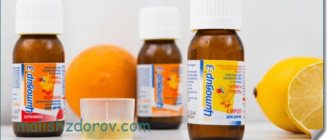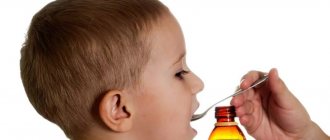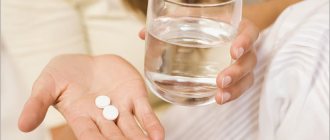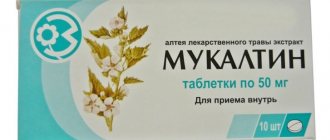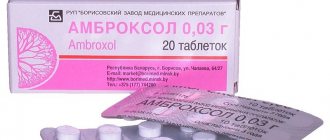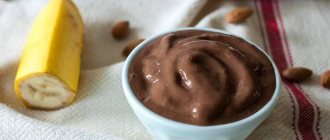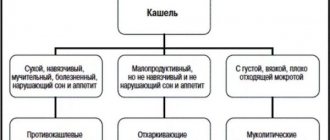The exact dose is calculated individually. The maximum one-time amount for children from 2 to 12 years old is half a teaspoon, after 12 years old - a teaspoon.
Overdose and long-term use of drugs with licorice lead to problems in the cardiovascular system, kidneys, dangerous imbalance of electrolyte balance in the blood serum - a decrease in the amount of potassium ions and an excess amount of sodium.
Combination with other medications
Preparations based on licorice root are allowed to be used together with other medications, with the exception of:
- diuretics, since licorice itself has this effect; simultaneous use leads to leaching of potassium from the body;
- laxatives - licorice will enhance their effect;
- cardiac glycosides - drugs for normalizing myocardial functions, etc.
Price of drugs with licorice
Licorice root is included in many cough medications - Doctor MOM, Codelac, Bronchofit, Elekasol. Doctor MOM in different pharmacy chains costs from 170 to 300 rubles.
Licorice root extract or syrup as an independent preparation is much cheaper - from 20 to 50 rubles. Licorice syrup is not sold for more than 100 rubles even in the center of Moscow.
This medicine is produced throughout the country: Ivanovo, Kirov, Samaramedprom, Rostov, Yaroslavl, Omsk pharmaceutical factories, JSC EKOlab, Flora Caucasus, Borshchagovsky HF plant, Tatkhimfarm, Vifitech, etc.
Reviews from parents
Most of those who have used licorice syrup to treat dry and wet cough evaluate it positively, and when asked whether children can have licorice syrup, they confidently answer “yes.”
- effectiveness: helps quickly and gently;
- has been used for a long time, well studied and tested;
- natural herbal preparation;
- Allowed for children from one year of age;
- inexpensive, available in all pharmacies;
- sweet syrup - a convenient form for babies;
- The medicine is ready-made, easy to use, convenient to dose - the package contains a measuring spoon or cup.
The disadvantages of mom and dad most often include the presence of sugar and alcohol in the composition; other contraindications are less often paid attention to.
Let's sum it up
Licorice extract is a natural herbal medicine that is an effective cough suppressant.
The drug is available without a prescription. In addition to syrup, licorice candies, lollipops, etc. are freely available in pharmacies (and even in regular stores).
Affordability and over-the-counter sales are dangerous because licorice is used uncontrolled.
Be careful: just because it is a natural, herbal product does not mean it is harmless. Yes, licorice quickly and effectively helps to cope with a lingering cough, but it can cause a lot of serious side problems.
Conclusion: Before giving your child licorice syrup, consult your doctor.
source
Licorice root syrup for coughs in children - instructions for use
Diseases of the respiratory system are most common in childhood. All parents face them, so the issue of choosing cough medications is very important for every mother. If a sick child coughs and the sputum is difficult to clear, he is prescribed medications with an expectorant effect.
Such drugs help make the mucus in the respiratory tract thinner and stimulate its secretion, resulting in a more productive cough.
Most often these medicines are presented as syrups. Some are made from herbal ingredients, while others are made from synthetic compounds. And when choosing a syrup for a small child, for example, at the age of 3 or 5 years, most mothers lean towards herbal remedies, one of which is licorice root syrup. In order for such a drug to help cope with a cough, you need to know how to use it for children and how much syrup to give the child depending on his age.
Features of the use of licorice root syrup
Liquorice root syrup is the most convenient dosage form, especially for children. But you can also drink licorice in the form of powder, tablets, granules, or thick liquid extract. At home, decoctions, infusions, and tinctures are prepared from dry plant materials.
Alternative dosage forms
- Licorice root tablets. They can be taken not only for inflammation of the respiratory system, but as an antispasmodic, laxative and anti-inflammatory agent for gastrointestinal diseases. This drug is also prescribed for asthenic syndrome, fatigue, neuroses, endocrine disorders, and to strengthen the immune system. The product helps with dermatitis, allergies, and is often prescribed for bronchial asthma. The tablets have age restrictions: they should not be taken by children under 12 years of age.
- Licorice root extract. It has the appearance of a thick, viscous mass, sold in plastic bags and cans. Often sold in large quantities to the pharmaceutical industry. Infusions, decoctions, as well as homemade syrups with added sugar and alcohol are prepared from it.
Cleansing the lymphatic system
Licorice syrup and tincture are used to cleanse the lymphatic system. The detoxifying properties of the herb were known back in ancient times. Tibetan and Chinese healers often used licorice as an antidote. Licorice can cleanse the body of waste and toxins. Lymph cleansing is carried out with the mandatory use of sorbents. After a course of cleansing therapy, the functioning of the kidneys and liver improves, metabolism is normalized, the immune system is strengthened, the skin is cleansed, the condition of the hair improves, and swelling goes away. How is the procedure performed?
- Taking licorice. Dilute 1 tbsp in a glass of hot water. l. syrup and drink the product. A reaction in the form of a runny nose and watery eyes is possible.
- Reception of sorbent. After an hour, take the sorbent (it is often recommended to drink Enterosgel). Its job is to remove toxins from the intestines.
- A course of treatment. Designed for 2 weeks. The procedure is carried out 3 times a day.
Consulting a doctor before cleansing the lymph is strictly required! The body's reaction can be unpredictable, side effects from digestion and the nervous system are possible, and chronic diseases may worsen.
For children
What are the uses of licorice root syrup for children? The instructions indicate age dosages:
- From 1 to 3 years. Single dose - 2.5 ml.
- From 4 to 6 years. Single dose - from 2.5 to 5 ml.
- From 7 to 9 years. Single dose - from 5 to 7.5 ml.
- From 10 to 12 years. Single dose - from 7.5 to 10 ml.
- After 12 years. Adult dosage is allowed, single dose - from 10 to 15 ml.
Of course, this gradation is arbitrary. The doctor prescribes a dose depending on the child’s weight. Syrup is contraindicated for children under one year of age.
It is important to know that licorice should not be used simultaneously with other cough remedies. This primarily applies to antitussives, which suppress severe coughing attacks.
When the sputum becomes liquefied and it becomes impossible to cough it up, a complication quickly develops—pneumonia. In children this process goes much faster. Therefore, you cannot independently treat a child’s cough without first examining a doctor. It is necessary to determine the type of cough - and then prescribe syrup.
For women
In gynecology, licorice root is valued for its natural estrogens (steroidal female sex hormones). When they decrease in a woman’s body, ovarian dysfunction may begin, which leads to disruption of the menstrual cycle. Often such disorders occur in the initial period of menopause. Syrup is prescribed to reduce testosterone and normalize the cycle. Licorice helps lower cholesterol, because it is the main carrier of testosterone. The medicine is also taken for painful periods, as the herb relieves cramps. Despite all the benefits of licorice, you should not drink it during pregnancy. Licorice is dangerous for pregnant women due to side effects. It can lead to the following consequences:
- water retention in the body;
- increased toxicosis;
- swelling;
- increased blood pressure;
- violation of water-salt balance;
- potassium leaching;
- negative impact on the hormonal system.
Also, the medicine is taken with caution during lactation, only after medical consultation. Licorice root syrup is the most effective herbal remedy for dry cough
It is prescribed for inflammation of the bronchi and lungs, bronchial asthma. The product is also used to cleanse the lymphatic system; in gynecology it is prescribed to reduce testosterone and normalize the menstrual cycle
Licorice root syrup is the most effective herbal remedy for dry cough. It is prescribed for inflammation of the bronchi and lungs, bronchial asthma. The product is also used to cleanse the lymphatic system; in gynecology it is prescribed to reduce testosterone and normalize the menstrual cycle.
Compound
100 grams of syrup contains 4 grams of its main active ingredient, represented by a thick extract of licorice roots. This plant, also called licorice or yellow root, has long been used in the treatment of coughs. It is found in the European part of the country, in Siberia, and also in the Caucasus. An extract is obtained from the roots of licorice, and then various medicines are made.
It is important to note that every 100 ml of licorice root syrup includes 10 ml of 96% ethyl alcohol. This information should be taken into account when choosing a remedy for treating cough in infants. The third component of the drug is sugar syrup, which contains 86 grams in a 100-gram bottle. This composition gives the syrup a brown color, a sweet taste and a peculiar smell.
To ensure that licorice extract does not lose its medicinal properties and is stored for a long time, it is produced in dark glass bottles. Some manufacturers add preservatives, water, purified glycerin, citric acid and other substances to the drug, but the most common drugs contain only licorice, sugar and alcohol.
How does it affect the child’s body?
The main effect of the syrup, which contains licorice root, is to stimulate the motor and secretory functions of the respiratory system. The drug is prescribed for a wet cough, as an expectorant, if there is a viscous, thick and difficult to separate secretion in the child’s bronchi.
The properties of the medicine are due to the presence in licorice roots of such active substances as glycyrrhizic acid, essential oils, glycyrrhizin, polysaccharides and flavone glycosides. It is these compounds that activate the function of epithelial cells of the respiratory tract and relieve spasm of the smooth muscles of the bronchi, due to which the mucus thins and its release during coughing is facilitated.
In addition to the expectorant effect, licorice syrup also has other effects:
- General strengthening of the child's body.
- Anti-inflammatory effect.
- Antimicrobial as well as antiviral effect.
- Stimulation of the child's body's defenses.
- Acceleration of healing of mucous membranes.
- Reducing blood cholesterol levels.
- Diuretic and laxative effect.
- Antitumor effect.
Healing properties of licorice
This plant has anti-inflammatory activity, and also relieves spasms of the respiratory tract and thins phlegm. The medicinal properties of licorice root are used to treat dry cough. It facilitates the removal of mucus, which ensures a faster recovery.
Once in the body, the active substance of licorice root acts in a complex manner, increasing overall immunity. This allows you to recover faster and avoid re-infection, as well as a secondary infection. This effect is supported by antimicrobial activity, especially against staphylococcus and the causative agent of peptic ulcer disease.
Advantages
The frequent use of licorice syrup in the treatment of cough in children is due to a fairly large number of positive characteristics of such a medicine:
- Licorice root syrup is an affordable, inexpensive drug found in many pharmacies.
- The medicine is based on plant materials (natural root extract), so it can be given in childhood.
- Thanks to the sweet taste, most sick children do not refuse this type of medicine.
- This syrup is a ready-made remedy that can be immediately given to a coughing child without the need to mix, boil or infuse anything.
- The thick syrup quickly envelops the mucous membrane and begins to act almost immediately after administration.
- Licorice syrup is quite convenient to dose. Many manufacturers include a measuring spoon or measuring cup in the packaging of such medicine.
Recommendations for taking syrup
Taking Licorice syrup
The rules for using licorice root syrup for cough differ for adults and children. This is explained by its power of influence. An overdose of drugs based on licorice root can cause unpleasant side effects. Therefore, you should carefully follow the instructions and dosage prescribed by your doctor.
Usually the medicine is diluted with boiled water in a ratio of 1 tbsp. l. for 1 glass. This method of use is suitable for adults. Frequency of administration: 3 times a day orally. If the mixture is diluted too much, the therapeutic effect will be insufficient. Overdose may cause complications. The course of treatment is 10 days.
The use of licorice-based medications in women to normalize the functioning of the reproductive system is carried out in a course. You should consume 1 tbsp daily. l. syrup 2 times a day before meals, half an hour. This will allow the substances to enter the bloodstream before food intake and ensure maximum therapeutic effect.
Admission in childhood
Children under 12 years of age should not take licorice root.
For children, the use of drugs based on licorice root according to the instructions is permitted no earlier than 12 years. In this case, the syrup is diluted in the following ratio: 1 tsp. medicine in ¼ cup of boiled water. If the dosage does not correspond to the patient’s age, side effects and complications of the disease may occur.
If the child has reached the age of 6 years, licorice root syrup may be prescribed for special indications. It is prescribed in the presence of a long-standing dry or wet cough. A particularly effective drug for problems with the discharge of sputum, which the child cannot remove from the bronchi. For such patients, the medicine is diluted at the rate of 50 drops per ½ cup of boiled water.
If the child is in the age group from 2 to 6 years, he is prescribed licorice syrup if there is no positive dynamics after a course of cough treatment with alternative drugs. In this case, the medicine is diluted in 10 g. water, taking 2-10 drops of the drug.
For children under 2 years of age, the dosage does not exceed 2 drops of the drug per 10 g. water. To do this, the syrup is diluted in a teaspoon. The medicine is taken no more than 3 times a day. If the cough does not go away within a 10-day course of treatment, it is necessary to change the drug to a more effective and age-appropriate one.
Indications
Given the expectorant effect, licorice root syrup is most often prescribed:
- For acute bronchitis.
- To relieve cough in acute laryngitis.
- For pneumonia.
- With tracheitis.
- For chronic bronchitis.
- For bronchiectasis.
The drug can also be prescribed during surgery on the respiratory tract, both before and after the intervention. It is also recommended for gastritis or peptic ulcers, but only during the period of recovery and remission.
Contraindications
Before you figure out how to give licorice syrup to children, you should take into account the presence of some contraindications to such a remedy.
This drug should not be given to children with:
- Hypersensitivity to any of the components of the drug.
- Gastritis in the acute stage.
- Bronchial asthma.
- Heart rhythm disturbances.
- Peptic ulcer of the digestive system.
- Hypertension.
- Impaired kidney or liver function.
For diabetes mellitus, the medicine must be prescribed very carefully, because it contains sugar.
For more information about the benefits of licorice root, see the program “Live Healthy.”
Contraindications to the use of licorice
Since licorice root is a potent natural substance, its use for cough is limited by contraindications. Side effects include increased blood pressure, dizziness, joint pain, nausea and increased stress on the liver. The range of use of drugs is limited to diseases that exclude the presence of these symptoms.
For coughs in children, licorice root syrup is often prescribed, but alcohol infusion is strictly not recommended for them. The following conditions are strictly prohibited from treatment with these drugs:
Licorice decoction is prohibited for diabetes mellitus
- diabetes;
- arrhythmias of various types;
- kidney dysfunction;
- liver pathologies;
- hypertonic disease;
- pathologies of the heart structure;
- pregnancy and breastfeeding;
- hypokalemia;
- individual allergic reactions.
An absolute contraindication to treating cough with licorice root is pregnancy. This is due to the action of an active substance that relaxes smooth muscle cells. In this regard, the bronchi expand, their spasm is relieved, but the muscles of the uterus are also able to respond to this by decreasing tone. Due to the presence of estrogen precursors in licorice, the hormonal balance is disrupted, which is why pregnancy is threatened with termination.
Licorice root syrup can lead to edema, which increases the risk of preeclampsia - a serious pregnancy complication that threatens the life of both the child and the mother.
Related video: Licorice root for cough
At what age can it be used in children?
The syrup, which is made from licorice root extract, is approved for use at any age, but most pediatricians do not advise giving this product to children in the first year of life due to the presence of ethyl alcohol in its composition. The use of licorice syrup is recommended for children who are already 1 year old.
In this case, the use of this medicine in children 1-12 years old must be agreed with the attending physician, who will clarify the dosage and determine whether there are any contraindications. The doctor will also take into account that this medicine is incompatible with some other medications. For these reasons, giving licorice syrup to children under 12 years of age is not recommended.
Methods of application
The medicine is taken orally after meals, but before giving it to your child to drink, you should find out how to dilute this medicine. To dilute the syrup, children need to take boiled water at room temperature. In addition, the bottle should be shaken before measuring the required dose of syrup. If the drug is measured in drops, they are dripped into a spoon with water.
- Children aged 1-2 years are given 1 or 2 drops of syrup per dose.
- For children over 2 years old, the required amount of medicine is diluted in a tablespoon or a quarter glass of water.
- At the age of 2 to 6 years, the dose of the drug can vary from 2 to 10 drops, for example, a 4-year-old child can be given 5 drops of syrup per dose.
- For children over 7 years of age and up to 12 years of age, it is recommended to dilute 50 drops of the medicine in half a glass of water.
Max. A single dosage of licorice syrup depending on age is as follows:
Children under two years old
The number of drops is equal to the child’s age in years.
Children from 2 to 12 years old
Children over 12 years old
The frequency of use of the syrup is three times a day, and the duration of treatment is from 7 to 10 days. To make the expectorant effect of such a medicine more pronounced, the child should be given a lot of warm drinks, for example, weak tea or unsweetened compote.
Dosages for children of different ages
When measuring the correct amount of syrup (in drops, teaspoons), take into account that the maximum single dose for a two-year-old child is two drops (see also: Prospan syrup for children with instructions). Sometimes experts use a simpler dosage regimen, prescribing to take as many drops at a time as the child’s current age. Dosages according to instructions:
- up to 2 years – 1-2 drops per 1 tsp. water 3 times/day;
- from 2 to 6 years – 2-10 drops per 1 tsp. water 3 times/day;
- from 6 to 12 years – 50 drops per 0.5 tbsp. water 3 times/day;
- from 12 years – 0.5 tsp. for 1 tsp. water 3 r/day.
Side effect
Some children who take licorice root syrup experience nausea and may have diarrhea. The drug can also cause an allergic reaction, which is manifested by itching, swelling and redness of the skin, and rash. If such signs of intolerance occur, the medicine is discontinued, replacing it with a drug with a similar effect.
Side effects may also appear if the recommended treatment period is not followed (taken for more than 10 days). If you use licorice products for a long time, it can lead to an imbalance of fluids and electrolytes in the body, which will cause swelling and increase blood pressure.
The same side effect is noted when combining licorice root syrup with diuretics, cardiac glycosides, laxatives and some other groups of drugs. It is very dangerous to take such syrup together with antitussive medications that can suppress the cough reflex.
Reviews and price
Before taking syrup with licorice root extract, you should also read reviews from parents who have already given this medicine to their coughing children. In most cases, licorice root syrup receives positive feedback, noting that such a remedy is really effective in helping with coughs in children.
Among the advantages of the drug are its availability, pleasant sweet taste, and natural composition. Many mothers consider the disadvantages of licorice syrup to be the presence of alcohol and sugar in the medicine, as well as the presence of contraindications.
As for the cost of licorice syrup, domestic preparations and syrups produced in neighboring countries are inexpensive. For packaging of medicine from manufacturers such as Samaramedprom, Viola, Omsk Pharmaceutical Factory, Flora Caucasus or Borshchagovsky HF Plant, you will pay from 20 to 50 rubles.
Other licorice preparations
Licorice root syrup is not the only option for a medicine containing an extract of this plant. Licorice is available in pharmacies in the form of tablets, and is also added to various herbal infusions and complex cough syrups.
You can also buy licorice candies, which in addition to the plant extract contain sugar, gelatin, molasses, starch, flavorings and other substances. Children like these sweets and can be used to treat coughs in childhood.
For more information about the treatment of cough in children, see Dr. Komarovsky’s program.
source
Use of decoction and tincture
Licorice decoction for cough can be purchased ready-made in some pharmacies. But it is not difficult to prepare it yourself. To do this, you need to buy crushed licorice root at the pharmacy. Take 1 tbsp. l. and pour it into a saucepan, into which a glass of boiling water is poured. Next, turn on a small fire and cook on it for 30 minutes. Afterwards, the resulting solution is filtered, cooled and consumed.
Licorice decoction for cough at home
The water-based decoction is approved for use in children, as it does not contain alcohol and large amounts of sugar. But the doctor should calculate the amount of cough medicine based on the age of the child, the current illness and the individual characteristics of the body.
The daily cough dose for an adult is 1 glass of drink. It can be drunk at one time or divided into 3 doses.
The solution is prepared by pouring ½ liter of boiling water over 1 tbsp. l. crushed licorice root. The infusion is made one night. The next morning, filter the solution and then consume 50 ml in 3-4 doses throughout the day.
The alcohol infusion is prepared for 10-14 days from 1 tbsp. l. raw materials and a glass of alcohol. The liquid must be stored in a dark place. It is used for coughing, 30 drops 2 times a day, diluted with warm boiled water. Treatment with alcohol infusion is contraindicated for children. However, its effectiveness in coughing is much higher than that of syrup or decoction. This is due to the increased antibacterial effect due to the addition of alcohol.
Biologically active substances
The raw material for the production of syrup is licorice root, otherwise known as licorice, or licorice. The composition is unique in its content of biologically active substances:
- organic acids (succinic, malic, tartaric, citric, fumaric);
- essential oils;
- steroids;
- bioflavonoids (kaempferol, quercetin, apigenin);
- alkaloids;
- carbohydrates (fructose, sucrose, maltose, glucose);
- fatty acid;
- tannins, resins;
- coumarins;
- glycyrrhizic, ferulic and salicylic acids.
Effect of syrup
The exceptional effect of the syrup is explained by its universal action. It eliminates not only the symptom (cough), but also affects the cause of the disease (viruses, bacteria). The advantages of this herbal remedy include a strengthening effect on the child’s body as a whole and rapid relief of local manifestations (inflammation, swelling, pain).
Licorice can cope with such manifestations of the disease as:
- dry cough (thin the mucus and remove it from the bronchi and lungs);
- paroxysmal cough (relieves inflammation and swelling of the respiratory tract);
- restless sleep during illness (has an analgesic and sedative effect).
The wide spectrum of action of licorice root syrup helps to shorten the course of the disease, reduce the manifestations of its symptoms and prevent complications in case of acute or exacerbation of the chronic course:
- pneumonia,
- laryngitis,
- tracheitis,
- tracheobronchitis,
- bronchitis,
- bronchial asthma,
- bronchiectasis.
Indications and contraindications for use - instructions for adults
Most often, licorice root syrup is used to treat diseases of the upper and lower respiratory tract accompanied by cough. Indications include:
- Bronchitis in acute or chronic form.
- Pneumonia (pneumonia).
- Tracheitis.
- Atelectasis when the bronchi are blocked by a plug of mucus.
- Bronchiectasis.
- Bronchial asthma.
Licorice root syrup is also used to sanitize the bronchi before and after operations, as well as to treat gastritis during remission, stomach and duodenal ulcers during the healing period.
Contraindications for the use of this drug:
- Hypersensitivity to some components included in the drug.
- Pregnancy and breastfeeding.
- Gastritis, peptic ulcer of the stomach, duodenum during exacerbation.
The syrup should be taken with extreme caution by children due to the presence of ethyl alcohol in the composition, as well as by diabetes mellitus, since the drug contains quite a lot of sugar.
Does it help during pregnancy, what is the correct way to drink it?
Licorice root syrup is contraindicated during pregnancy. This is explained by the fact that licorice has a strong effect on water-salt metabolism in the body. And for pregnant women, this is fraught with the occurrence of edema. Edema, in turn, leads to late toxicosis, the most severe and dangerous stage of which is eclampsia, accompanied by convulsions.
Licorice also increases hormonal activity. And sudden changes in hormonal levels during pregnancy can lead to miscarriage.
How to take for small children
Licorice root syrup can be used to treat children
But you need to pay attention to the application features:
- You should not take medications that are incompatible with licorice root. If they are aimed at suppressing cough and contain codeine, then simultaneous use is contraindicated.
- It is not recommended to give licorice root syrup to children under one year of age, as it contains alcohol.
- Licorice syrup can be washed down or diluted in boiled water at room temperature. This ensures faster removal of sputum.
- If one or two days after taking the drug the child’s condition has not improved, then you should consult a doctor.
Instructions for use
How to take licorice root? It is recommended to take the syrup after meals 3-4 times a day, mixing a single dose with warm boiled water. To ensure productive production of sputum during treatment, increase the child’s drinking regime by offering compote, tea, and boiled water without added sugar during the day.
Dosage
The packaging box with syrup usually contains a measuring spoon, with which you can easily measure the required single dose:
- from 1 year to 3 years – 2.5 ml;
- from 3 to 6 years – increases from 2.5 ml to 5.0 ml;
- from 6 to 9 years – from 5.0 to 7.5 ml;
- from 9 to 12 years – from 7.5 to 10.0 ml will be enough;
- over 12 years old - 15 ml of syrup.
Children should take licorice syrup diluted in water. From 3 to 12 years old, a single dose is mixed with 50 ml of water, and over 12 years old - with 100 ml. For the youngest patients (up to 3 years), the amount of water for diluting the syrup should be only 15-25 ml.
The drug is not prescribed to children under one year of age due to the presence of ethanol (ethyl alcohol) in it.
The doctor may choose another regimen for treatment with licorice syrup, where the dosage in ml is replaced by drops. In this case, at one time, give as many drops as the child is full years old. Before taking, measured drops are also diluted with water.
Course duration
In most cases, treatment with licorice syrup relieves cough already on the 3-4th day of use. The course is designed for a period of 7 to 10 days (no more) and is adjusted by the pediatrician individually, taking into account the severity and course of the disease, and the extinction of symptoms.
Contraindications
Licorice root syrup is usually well tolerated by children and rarely causes allergic manifestations: redness of the skin, the appearance of a pink rash, diarrhea, nausea, and swelling.
The list of contraindications is limited:
- under 1 year of age;
- allergy to the drug;
- severe form of bronchial asthma;
- exacerbation of chronic diseases of the gastrointestinal tract.
Side effects
With a long course of treatment, a slight loss of potassium salts by the body is possible. To avoid a deficiency of this mineral element, while taking syrup, it is useful to enrich the child’s diet with bananas, dried apricots, raisins, buckwheat and oatmeal porridge, peanuts, and walnuts.
Uncontrolled use of licorice for cough can cause nausea, diarrhea, swelling and high blood pressure.
Compatibility with other cough medications
When treating cough in children with licorice syrup with a pronounced expectorant effect, you should not take antitussive drugs at the same time.
The action of licorice is designed to liquefy and remove mucous secretions from the respiratory tract.
In the absence of a cough, stagnation of sputum poses a threat of complications, since it represents a favorable environment for the growth and development of pathogenic microbes and disrupts natural ventilation.
Licorice root syrup: instructions for use for children
Licorice root for coughs for children is a proven, effective and inexpensive expectorant. How to give it to a child, does the medicine have side effects and when is it contraindicated?
Indications for use
Licorice root has been used to treat coughs, inflammations, and lichens for thousands of years.
Today, the main indications for the use of licorice are diseases of the upper respiratory tract and lungs.
This natural herbal medicine has an expectorant, antiviral, antispasmodic effect, accelerates the healing of mucous membranes, and strengthens the immune system. As prescribed by a pediatrician, licorice root can be given to children for the treatment of:
- bronchitis;
- tracheitis;
- laryngitis;
- pneumonia;
- inflammation of the urinary tract;
- diseases of the gastrointestinal tract - ulcers and gastritis (during the recovery period).
The drug is used as part of complex therapy - neither pneumonia nor bronchitis can be cured with licorice alone.
Release form and composition
It is very convenient that cough licorice for children is available in the form of syrup. Packaging - dark glass or polyethylene bottles of 50 and 100 grams in cardboard boxes with a measuring spoon or cup.
One hundred grams of syrup contains 4 grams of extract of licorice roots and Ural licorice; the remaining 96 are a solution of ethyl alcohol with sugar.
The extract contains bioflavonoids, glycyrrhizic acid, systosterol, glycyrrhizin, they strengthen the body and support the immune system. The drug contains ascorbic acid, essential oils, etc.
The finished syrup is a thick red-brown liquid.
It is viscous, so it coats the throat and airways well.
The syrup is sweet, and children drink it with pleasure.
A closed bottle of syrup can be stored for two years, an opened bottle for up to three months at a temperature not exceeding +25 ° C, out of the reach of children.
When asked whether licorice can be given to young children, all doctors unanimously answer: only after a year. The drug contains ethyl alcohol and is contraindicated for infants.
Pharmacies sell licorice root from different manufacturers. Some have glycerin and preservatives added to the drug. Read the ingredients carefully: for children, a syrup containing only licorice, alcohol and sugar is preferable.
How does licorice syrup work?
Licorice is an effective expectorant.
Syrup is prescribed for wet coughs, when thick pus accumulates in the bronchi and is difficult to clear.
Substances in licorice cause epithelial cells to activate, relieve bronchospasm, mucus becomes liquid and coughs up well.
Licorice root has a general strengthening, anti-inflammatory effect, helps heal microcracks in the mucous membranes, lowers cholesterol, and has a laxative and diuretic effect.
Side effects and contraindications
Despite the fact that licorice cough syrup for children is an effective, affordable remedy and is sold without a prescription, it should not be taken uncontrollably.
The attitude of doctors towards licorice-based drugs is cautious and ambiguous. Reason - possible side effects:
- allergic reactions to the components of the drug in the form of a rash, diathesis on the face, arms, legs;
- nausea;
- the drug contains a lot of sugar. For those who have a tendency to increase blood glucose levels, its loading dose in syrup is dangerous;
- increased blood pressure;
- increased heart rate, heart murmurs;
- swelling.
Licorice syrup, when taken for a long time, affects hormonal levels - it increases the amount of estrogen. This leads to disorders in both women and men.
Absolute contraindications to taking medications with licorice:
- hypersensitivity to the components of the drug;
- bronchial asthma;
- hypertension;
- heart rhythm disturbances;
- exacerbation of gastritis or peptic ulcer;
- pregnancy;
- glaucoma;
- children's age (up to 1 year);
- liver dysfunction;
- renal failure.
Directions for use for children
In each specific case, the doctor decides whether children can take licorice root or not. He also calculates the dosage and duration of treatment - no more than 10 days.
The syrup is diluted in water and given to children three times a day after meals. For the best coughing effect, the child needs a lot of warm drinks.
Standard dosage by age:
| Child's age | Licorice syrup dosage |
| From 1 year to 2 years | 2 drops of syrup diluted in 1/2 teaspoon of water |
3 times a day
From 2 to 6 years From 3 to 10 drops in 1/2 teaspoon of water
3 times a day
From 7 to 12 years Up to 50 drops in 1/2 teaspoon of water
3 times a day
Selection of manufacturer and composition
Licorice syrup is available in volumes of 100, 200 and 250 ml. The manufacturer claims a long shelf life (2 years), but keep in mind that an open bottle can be stored in the refrigerator for no more than 3 months. Therefore, for children it is more advisable to purchase the medicine in a volume of 100 ml.
The composition of the drug is practically the same from different manufacturers. Required components:
- licorice root extract (4 g);
- sugar syrup (86 ml);
- ethanol (90% - 10 ml).
This recipe is followed by many Russian pharmaceutical enterprises: Vifitech (Moscow), Begrif (Novosibirsk), Samaramedprom (Samara), EKOlab (Moscow) and others.
Such a recipe causes allergic reactions and can harm the baby’s health, and licorice syrup loses its main advantage - safety.
Reviews from parents
Reviews from moms and dads about the natural product indicate that it is quite effective.
Tatiana. I constantly treat my eldest son’s cough with licorice. Until I was 5 years old, I diluted the syrup with water, but now I use weak tea, without sugar. I always notice a quick effect. The cough becomes wet and the sputum is cleared well. But things didn’t work out with the smaller child when a rash appeared on the sweet syrup.
Alexander. We always choose natural herbal preparations. I myself “grew up” on licorice decoction and I prefer to treat a child’s cough with its syrup. He drinks willingly. Rarely is efficiency combined with pleasant taste. We notice an improvement already from the second day. The main thing is to start treatment on time and not give your child sleepless nights.
Irina. The syrup was prescribed by the local pediatrician. I was pleased with the result. Already from the 3rd day my condition improved noticeably. She began to cough up mucus easily, and the coughing attacks went away. They took it for 6 days, and after that there was nothing to treat.
Other forms of release
An alternative to licorice root syrup is lozenges and lozenges. They are intended to be absorbed in the mouth and are suitable for treatment for children over 12 years of age. In addition to treating coughs, they are used as a remedy to relieve spasms, constipation, inflammation of the digestive and respiratory organs.
In folk medicine, a decoction of licorice roots is used for medicinal and cosmetic purposes. In children's practice for combating painful coughs, it has lost its relevance. The labor-intensive preparation of a decoction was replaced by ready-made forms of medicinal products from licorice root.
Dosage forms of release
Licorice root is used to prepare various medicines. The most popular form of release is syrup. In this form, licorice root is used for coughs for children and adults. The additives contain sugar syrup, so patients with diabetes need to be careful. Most often, the drug is prescribed for cough in children over 12 years of age, but if there are special indications, from birth or from two years of age.
An alcohol-based infusion is contraindicated for a child, but can be used to treat cough in adult patients. The effectiveness of such drugs is higher than that of Licorice syrup. This is explained by the bactericidal effect of alcohol, which enhances the effect of the active substance.
Licorice decoction is prepared at home from crushed root. Its effectiveness is equal to syrup. But the decoction does not contain sugar, so it is the preferred dosage form for patients with diabetes.
Indications for use
Preparations based on licorice root extract have various pharmacological properties. Therefore, the range of their applications is diverse.
Licorice syrup is used for several diseases:
- bronchial asthma;
- bronchitis;
- COPD;
- bronchiectasis;
- lobar pneumonia;
- tracheitis;
- smoker's bronchitis.
These pathologies are accompanied by blockage of the bronchi with viscous sputum. Licorice preparations also help with non-productive (dry) and wet coughs, turning them into productive ones. This facilitates the course of the disease and speeds up recovery.
